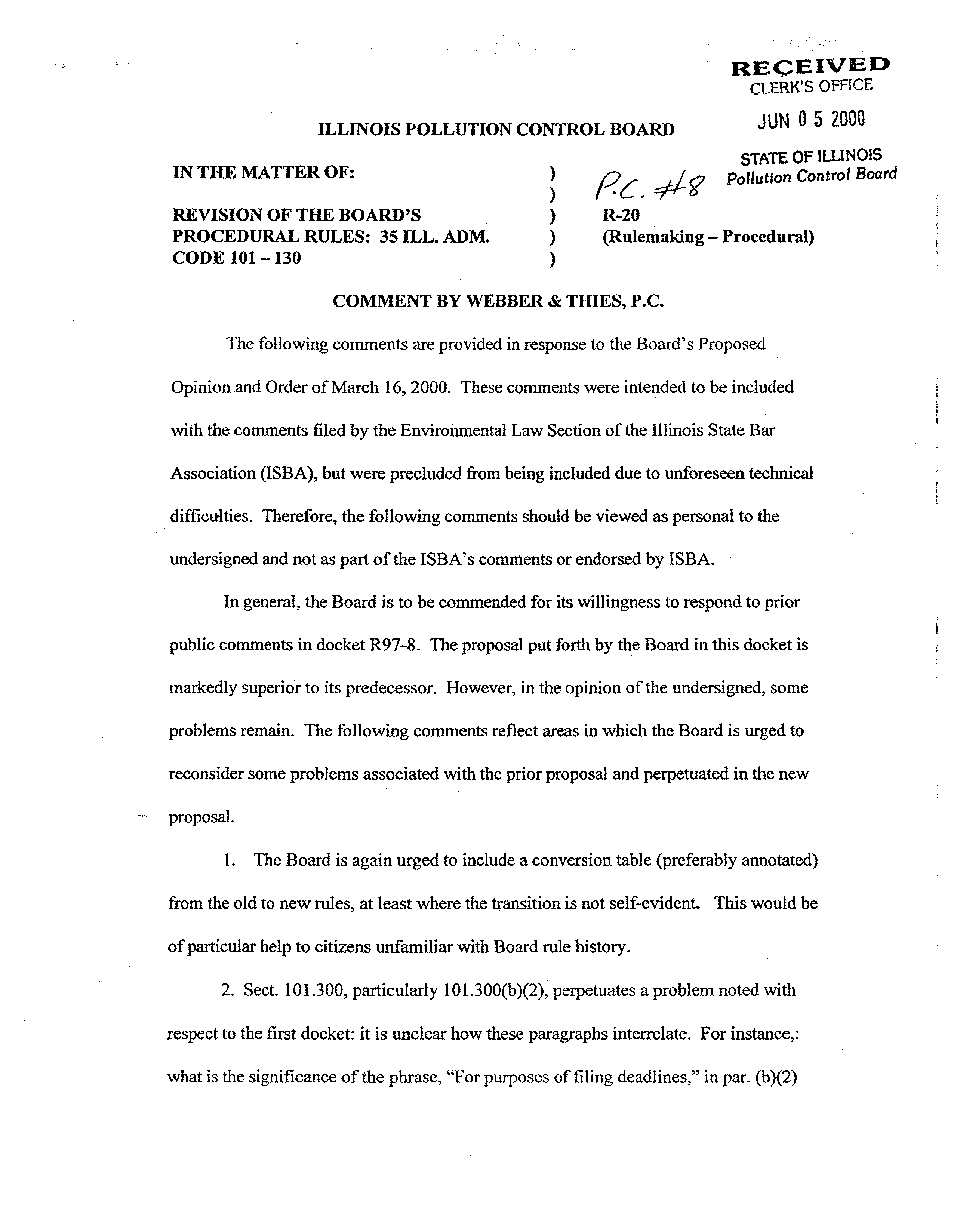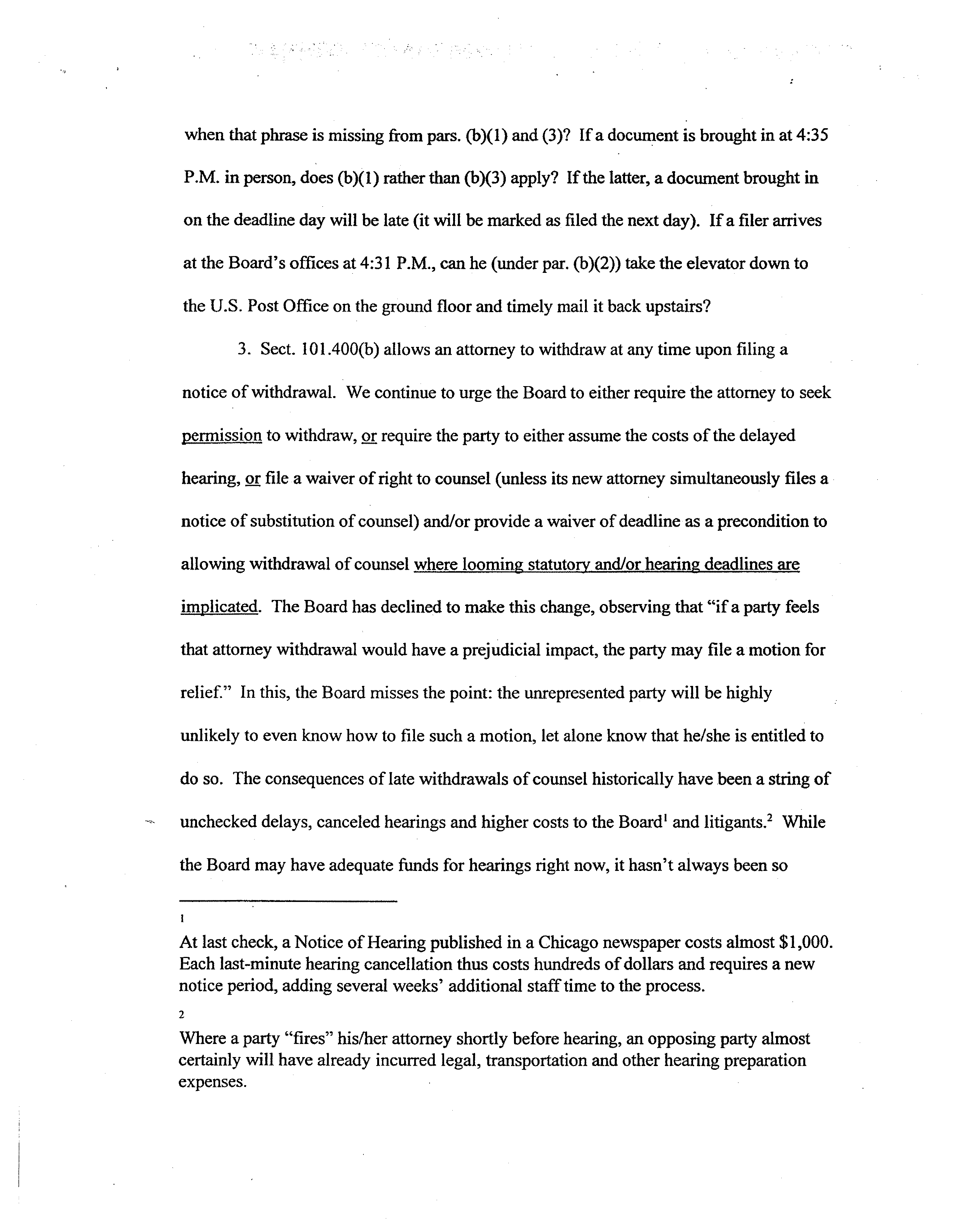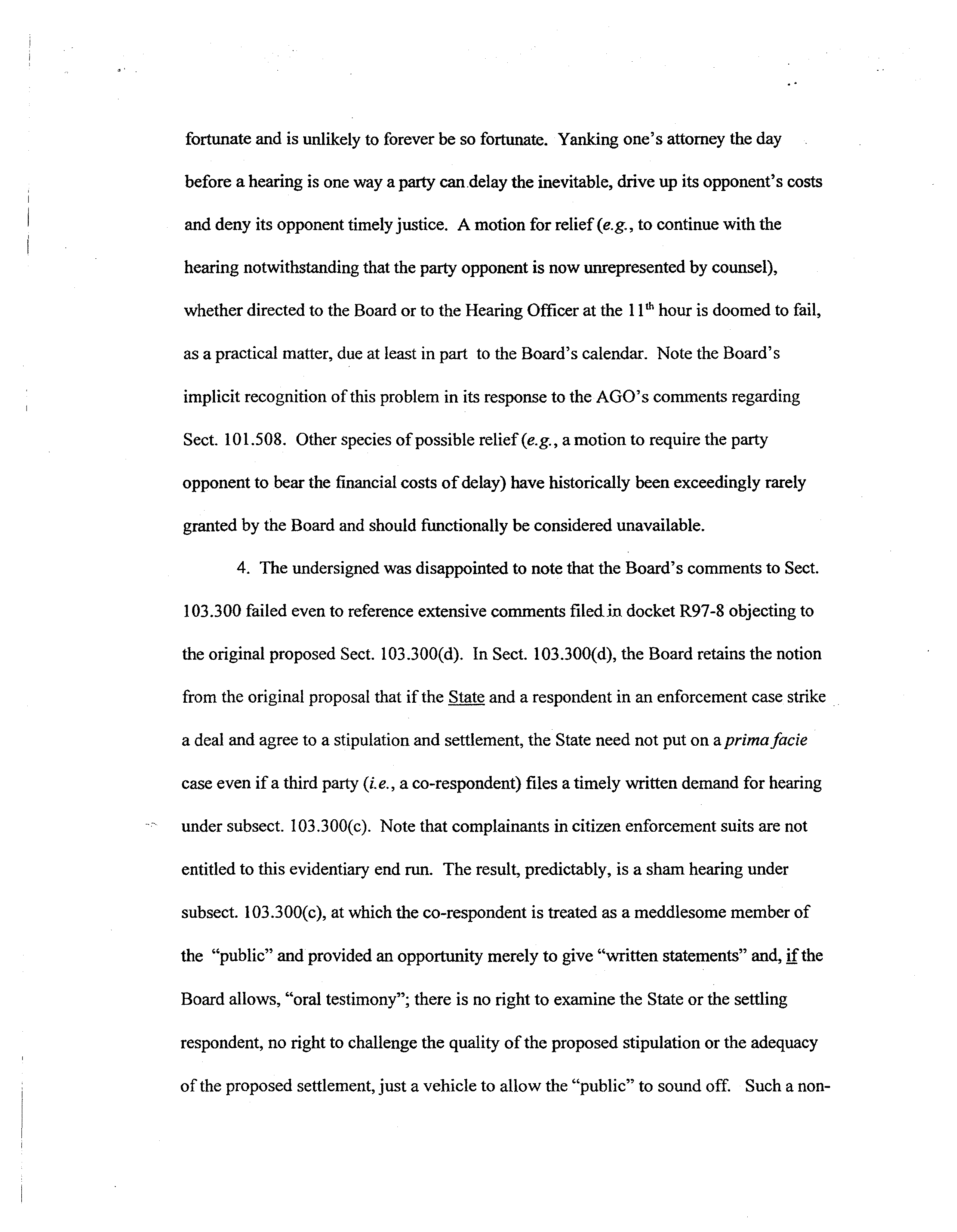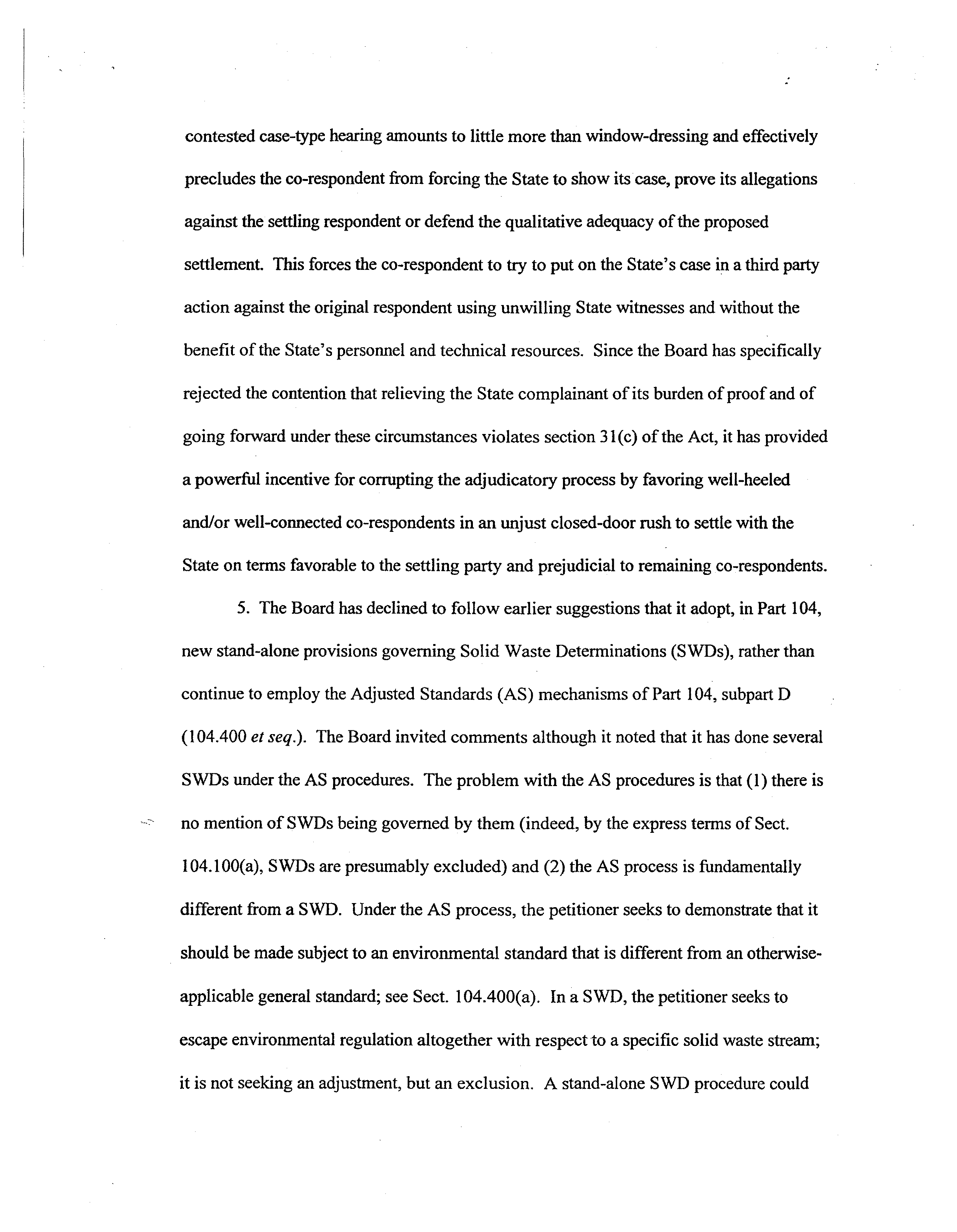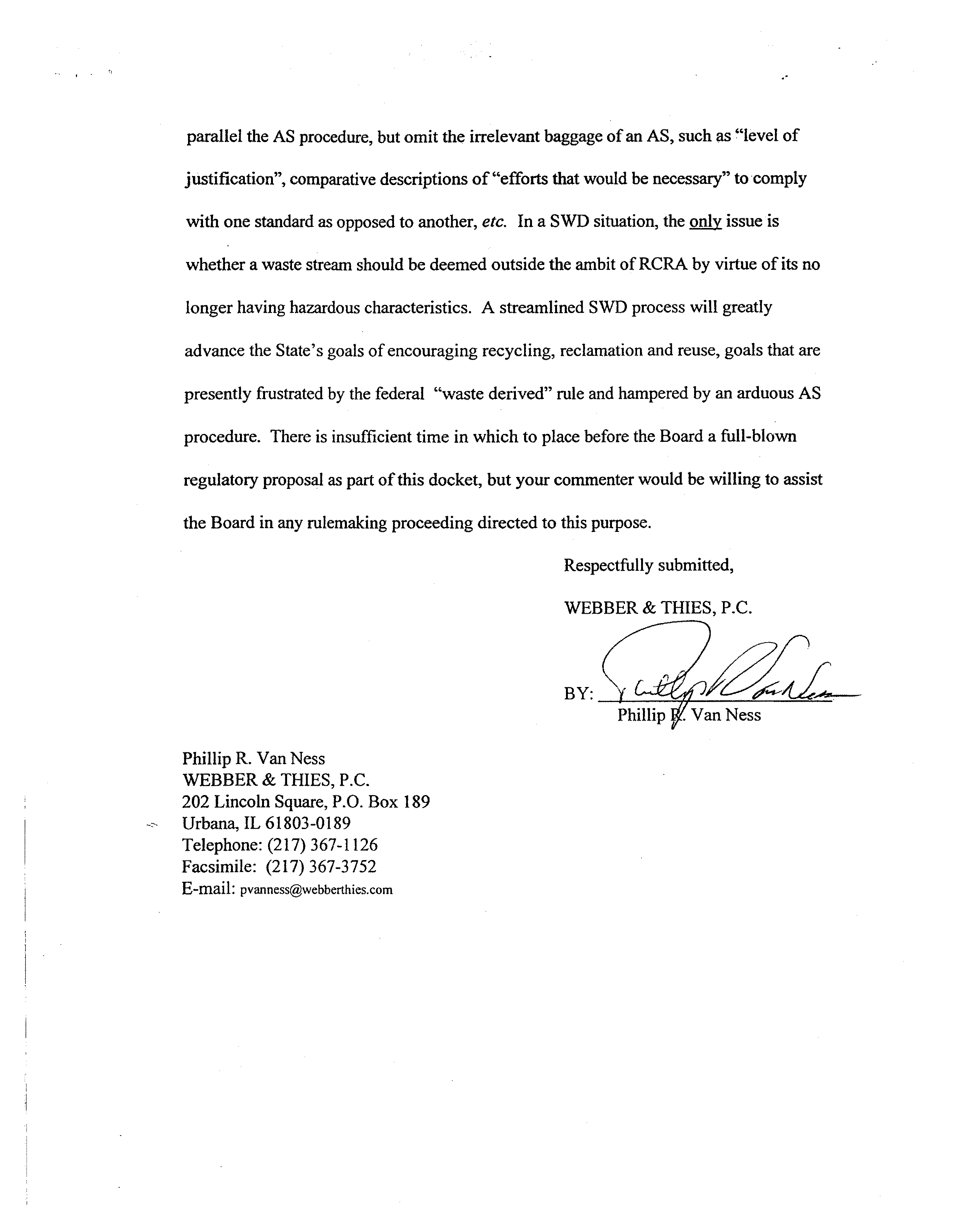RECEIVED
CLER(’S
OFFICE
ILLINOIS POLLUTION CONTROL
BOARD
~
052000
STATE OF IWNOIS
IN
THE
MATTER
OF:
)
p~-
~L~j’
Pollution
Control.Board
REVISION OF
THE
BOARD’S
)
R-20
PROCEDURAL RULES:
35 ILL. ADM.
)
(Rulemaking
—
Procedural)
CODE 101—130
)
COMMENT BY WEBBER & TilES,
P.C.
The following comments are provided in response to the Board’s Proposed
Opinion and Order of March 16, 2000.
These comments were intended to be included
with the comments filed by the Environmental
Law Section ofthe Illinois State Bar
Association (ISBA), but were precluded from being included due to unforeseen technical
difficulties.
Therefore, the following comments should be viewed as personal to the
undersigned and not as part ofthe ISBA’s comments orendorsed by ISBA.
In general, the Board is to be commended for its willingness to respond to prior
public comments in docket R97-.8.
The proposal put forth by the Board in this docket is
markedly superior to its predecessor.
However, in the opinionofthe undersigned, some
problems remain.
The following comments reflect areas in which the Board is urged to
reconsider some problems associated with the prior proposal and perpetuated in the new
proposal.
1.
The Board is again urged to include a conversion table (preferably annotated)
from the old to newrules, at least where the transition is not self-evident.
This would be
ofparticular help to citizens unfamiliar with Board rule history.
2.
Sect.
10 1.300, particularly
l01.300(b)(2), perpetuates a problem noted with
respect to the first docket:
it
is unclear howthese paragraphs interrelate.
For instance,:
what is the significance ofthe phrase, “For purposes offiling deadlines,” in par. (b)(2)
when that phrase is missing from pars. (b)(1) and (3)?
Ifa document is brought in at
4:35
P.M. in person, does (b)(l) ratherthan (bX3) apply? Ifthe latter, a document brought in
on the deadline day will be late (it will be marked as filed the nextday).
Ifa filer arrives
at the Board’s offices at 4:31
P.M., canhe (under par, (b)(2)) take the elevatordownto
the U.S. Post Office on the ground floor and timely mail it back upstairs?
3.
Sect.
101.400(b) allows an attorney to withdraw at any time upon filing a
notice ofwithdrawal.
We continue to urge the Board to either require the attorney to seek
permission to withdraw, ~
require the party to either assume the costs ofthe delayed
hearing, ~
file a waiver ofright to counsel (unless its new attorney simultaneously filesa
notice of substitution ofcounsel) and/orprovide a waiver ofdeadline as a precondition to
allowing withdrawal ofcounsel where looming statutory and/or hearing deadlines are
implicated.
The Board has declined to
make this change, observing that “ifa party feels
that attorney withdrawal would have a prejudicial impact, the party may file a motion for
relief.”
In this, the Board misses the point: the unrepresented party will be highly
unlikely to even know how to
file such a motion, let alone know that he/she is entitled to
do so.
The consequences of late withdrawals ofcounsel historically have been a string of
unchecked delays, canceled hearings and higher costs to the Board’ and litigants.2
While
the Board may haveadequate funds for hearings right now, ithasn’t always been so
At last check, a Notice ofHearing published in a Chicago newspaper costs almost $1,000.
Each last-minute hearing cancellation thus costs hundreds ofdollars and requires a new
notice period, adding several weeks’ additional stafftime to the process.
2
Where a party “fires” his/her attorney shortly before hearing, an opposing party almost
certainly will have already incurred legal, transportation and other hearing preparation
expenses.
fortunate and is unlikely to forever be so fortunate.
Yanking one’s attorney the day
before a hearing is one waya partycandelay the inevitable, drive up its opponent’s costs
and deny its opponent timely justice.
A motion for relief
(e.g.,
to continue with the
hearing notwithstanding that the
party
opponent is now unrepresented by counsel),
whetherdirected to the Board or to the Hearing Officerat the
11
lb
hour is doomed to fail,
as a practical matter, due at least in part
to the Board’s calendar.
Note the Board’s
implicit recognition ofthis problem in its response to the AGO’s comments regarding
Sect.
101.508.
Other species of possible relief
(e.g.,
a motion to require the
party
opponent to bear the financial costs ofdelay) have historically been exceedingly rarely
granted by the Board and should functionally be considered unavailable.
4.
The undersignedwas disappointed to notethat the Board’s comments to Sect.
103.300 failed even to reference extensive comments filedin docket R97-8 objecting to
the original proposed Sect.
103.300(d).
In Sect.
103.300(d), the Board retains the notion
from the original proposal that if the State and a respondent in an enforcement case strike
a deal and agree to a stipulation and settlement, the State need not put on a
primafacie
case even if a third party
(i.e.,
a co-respondent) files a timely written demand for hearing
under subsect.
103.300(c).
Note that complainants in citizen enforcement suits are not
entitled to this evidentiary end run.
The result, predictably, is a sham hearing under
subsect.
103.300(c), at which the co-respondent is treated as a meddlesome member of
the
“public” and provided an opportunity merely to give “written statements” and, jfthe
Board allows, “oral testimony”; there is
no right to examinethe
State orthe settling
respondent, no right to challenge the quality ofthe proposed stipulation or the adequacy
ofthe proposed settlement, just a vehicleto allow the “public” to sound off.
Such a non-
contested case-type hearing amounts to little more than window-dressing and effectively
precludes the co-respondent from forcing the State to show its case, prove its allegations
againstthe settling respondent or defend the qualitative adequacy ofthe proposed
settlement.
This forces the co-respondent to try to put on the State’scase in a third
party
action against the original respondent using unwilling State witnesses and without the
benefit ofthe State’s personnel and technical resources.
Since the
Board has specifically
rejected the contention that relieving the State complainant of its burden of proofand of
going forward under these circumstances violates section 31(c) of the Act, it has provided
a powerful incentive forcorrupting the adjudicatory process by favoring well-heeled
and/or well-connected co-respondents in an unjust closed-door rush to
settle with the
State on terms favorable to the settling
party
and prejudicial to remaining co-respondents.
5.
The Board hasdeclined to follow earlier suggestions that it adopt,
in Part 104,
new stand-alone provisions governing Solid Waste Determinations (SWDs), rather than
continue to
employ the Adjusted Standards (AS) mechanisms of Part 104, subpart D
(104.400
et seq.).
The Board invited comments although it noted that it has done several
SWDs under the AS procedures.
The problem with the AS procedures is that (1) there is
no mention ofSWDs being governed by them (indeed, by the express terms of Sect.
104.100(a), SWDs are presumablyexcluded)
and (2) the AS process is fundamentally
different from a SWD.
Under the AS
process, the petitioner seeks to demonstrate that it
should be made subject to an environmental standard that
is different from an otherwise-
applicable general standard; see Sect.
104.400(a).
In a SWD, the petitioner seeks to
escape environmental regulation altogether with respectto a specific solid waste stream;
it is not seeking an adjustment, but an exclusion.
A stand-alone SWD procedure could
parallel the AS procedure, but omit the irrelevant baggage ofan AS, suchas “level of
justification”, comparative descriptions of“efforts that would be necessary” to comply
with one standard as opposed to another,
etc.
In a SWD situation, the ~
issue
is
whether a waste stream should be deemed outside the ambit ofRCRA by virtue of its no
longer having hazardous characteristics.
A streamlined SW!) process will greatly
advance the State’s goals ofencouraging recycling, reclamation and reuse, goals that are
presently frustratedby the federal
“waste derived” rule and hampered by an arduous AS
procedure.
There is insufficient time in which to place before the Board a full-blown
regulatory proposal as part ofthis docket, but your commenterwould be willing to assist
the Board in any rulemaking proceeding directed to this purpose.
Respectfully submitted,
WEBBER & THIES, P.C.
BY:__________________
Phillip
.
VanNess
Phillip R. VanNess
WEBBER & THIES, P.C.
202 Lincoln Square,
P.O. Box 189
Urbana, IL 61803-0189
Telephone: (217) 367-1126
Facsimile:
(217) 367-3752
E-mail:
pvanriess@webberthies.com
